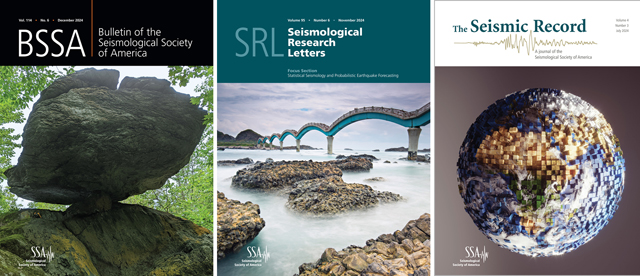5 May 2025—One of the reasons that Samantha Hansen serves as a reviewer for The Seismic Record is “to get a first look at projects being completed by our peers and colleagues,” she said. “This is not only very interesting, but it can also give you a better understanding of our current state of knowledge and where the big questions remain.”
“While I enjoy helping others improve upon their science, I also like the inspiration that serving as a reviewer sometimes provides,” added Hansen, a professor of geological sciences at the University of Alabama.
Together with Yihe Huang of the University of Michigan and Yicun Guo of the University of Chinese Academy of Sciences, Hansen was named an SSA Reviewer of the Year in recognition of the outstanding scientific expertise and constructive motivation and feedback they provided to our journal authors throughout 2024.
At the SSA Annual Meeting in Baltimore, Maryland, Hansen was recognized for her work on behalf of The Seismic Record (TSR), Guo for Seismological Research Letters (SRL) and Huang for the Bulletin of the Seismological Society of America (BSSA).
The SSA journal editors-in-chief selected the trio of top reviewers for the insightful comments they provided to authors as well as their excellent on-time records.

Often, as was the case with Guo, reviewers’ talents are put to work on both regular articles and special papers with a specific technical focus, where they collaborate with multiple editors under demanding deadlines.
In their time working with the SSA journals, the researchers have also learned a few tips on crafting an excellent scientific paper, which they share in their reviews.
One thing that Huang would like to see more of in papers is a discussion of “what has been previously known,” she said. “I think this is important because we want your paper to be successful if it’s published, so you do want to make sure that you are connected to the previous literature and also to the current [known] knowledge gaps.”
“I try to assess if enough details are provided for someone else to reproduce the findings. I also evaluate if the authors have considered alternative interpretations for their results and why these may or may not be valid,” Hansen noted. “That said, even if a paper covers the most interesting topic in the world, it won’t mean much if the ideas are not clearly conveyed; therefore, I also try to provide constructive feedback on writing style and organization.”
Serving as a reviewer can be especially useful for early-career researchers, giving them a chance to learn the breadth of their field and boost their visibility, according to Huang. “You can introduce yourself to editors this way, and I think this will benefit your career in the longer term,” she said.
Interested in becoming a SSA journal reviewer? Register with the Editorial Manager software (click “Register” at the site) to provide more information about your areas of expertise at BSSA (editorialmanager.com/bssa); SRL (editorialmanager.com/srl) or TSR (editorialmanager.com/tsr).
